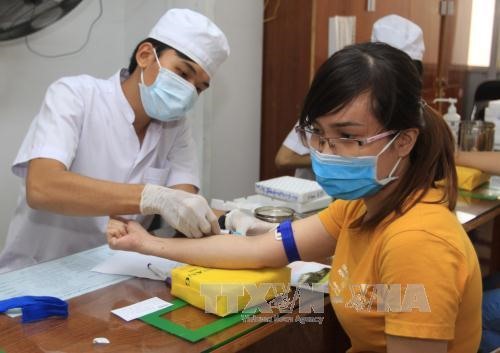 Society
Society

The HCM City Council’s standing board will work with the city's Department of Natural Resources and Environment to identify suspended construction projects that could be breeding grounds for the spread of the Zika virus.
 |
| A patient with fever and joint pain is tested for the Zika virus at District 2 Hospital in HCM City, one of 45 disease surveillance health facilities in the city. —VNA/VNS Photo Phương Vy |
HCM CITY — People’s Council members of HCM City will work with municipal authorities to identify potential breeding grounds for the Zika virus at project sites where construction has been suspended.
This was agreed at a meeting between the Standing Board of the HCM City People’s Council and city’s People’s Committee late last week.
Once the work is done, the city’s Department of Natural Resources and Environment will report results to district and grassroots councils who will oversee the spraying chemicals to kill mosquitoes and larvae at the identified sites and other areas, said Nguyễn Thị Quyết Tâm, Chairwoman of the HCM City People’s Council.
Tâm said the city People’s Council was keeping a close watch on the situation in order to help prevent an outbreak of the Zika virus.
Nguyễn Thị Thu, deputy head of the People’s Committee, said at the meeting that every district has sites where construction has been suspended, and the builders had not kept the sites clean. District administrations lacked sufficient funds to monitor and clear the sites, she said.
Tâm advised the municipal administration to co-operate with the city-based Việt Nam Fatherland Front and other departments as well as organisations to launch campaigns to spraying chemicals and kill both larvae and mosquitoes.
She said leaflets about ways to prevent Zika infections and their spread should be distributed to all households in order to improve public awareness about the need to kill mosquitoes and their larvae.
Dr Nguyễn Tấn Bỉnh, head of the city’s Department of Health, reported that 29 patients had tested positive for the Zika virus as of November 6. Districts with the highest Zika incidences were 12, 9, 2, Bình Thạnh and Tân Phú, he said.
As of November 5, 36 patients had tested positive for the Zika virus in HCM City and the provinces of Khánh Hòa (1), Long An (1), Bình Dương (2), Đắk Lắk (2), and Phú Yên (1), according to the General Department of Preventive Health.
Department head Trần Đắc Phu told the Tuổi Trẻ (Youth) newspaper that five of the patients were pregnant women.
The Preventive Health Department had on October 30 confirmed the country’s first case of microcephaly, or abnormal smallness of the head, in a four-month-old baby in the Central Highlands province of Đắk Lắk. It said the condition was likely related to Zika.
The Ministry of Health has prioritised efforts to ensure the health of pregnant women and reduce the risk of fetal microcephaly caused by the Zika virus.
Thu said she has asked district authorities to compile lists of pregnant women in their areas and advise them about preventive methods.
Six hospitals and institutes in Hà Nội, HCM City, Nha Trang and the Central Highlands region can provide testing for the Zika virus, with results available in seven days.
At a meeting with the Emergency Operation Centre in Hà Nội on November 5, Dr Trần Danh Cường, deputy head of the National Hospital of Obstetrics and Gynecology, said the country’s prenatal diagnosis system requires pregnant women to have ultrasound checks at 12, 22 and 32 weeks.
If patients follow the ultrasound schedule, fetal microcephaly can be detected and treated early, Cường said.
However, many women are unaware of the importance of these examinations and fail to comply with the recommended schedule, she said. —VNS




